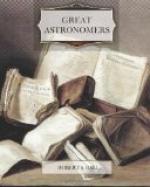Ussher died in 1790. During his brief career at the observatory, he observed eclipses, and is stated to have done other scientific work. The minutes of the Board declare that the infant institution had already obtained celebrity by his labours, and they urge the claims of his widow to a pension, on the ground that the disease from which he died had been contracted by his nightly vigils. The Board also promised a grant of fifty guineas as a help to bring out Dr. Ussher’s sermons. They advanced twenty guineas to his widow towards the publication of his astronomical papers. They ordered his bust to be executed for the observatory, and offered “The Death of Ussher” as the subject of a prize essay; but, so far as I can find, neither the sermons nor the papers, neither the bust nor the prize essay, ever came into being.
There was keen competition for the chair of Astronomy which the death of Ussher vacated. The two candidates were Rev. John Brinkley, of Caius College, Cambridge, a Senior Wrangler (born at Woodbridge, Suffolk, in 1763), and Mr. Stack, Fellow of Trinity College, Dublin, and author of a book on Optics. A majority of the Board at first supported Stack, while Provost Hely Hutchinson and one or two others supported Brinkley. In those days the Provost had a veto at elections, so that ultimately Stack was withdrawn and Brinkley was elected. This took place on the 11th December, 1790. The national press of the day commented on the preference shown to the young Englishman, Brinkley, over his Irish rival. An animated controversy ensued. The Provost himself condescended to enter the lists and to vindicate his policy by a long letter in the “Public Register” or “Freeman’s Journal,” of 21st December, 1790. This letter was anonymous, but its authorship is obvious. It gives the correspondence with Maskelyne and other eminent astronomers, whose advice and guidance had been sought by the Provost. It also contends that “the transactions of the Board ought not to be canvassed in the newspapers.” For this reference, as well as for much other information, I am indebted to my friend, the Rev. John Stubbs, D.D.
[Plate: The observatory, Dunsink. From a Photograph by W. Lawrence, Upper Sackville Street, Dublin.]
The next event in the history of the Observatory was the issue of Letters Patent (32 Geo. III., A.D. 1792), in which it is recited that “We grant and ordain that there shall be forever hereafter a Professor of Astronomy, on the foundation of Dr. Andrews, to be called and known by the name of the Royal Astronomer of Ireland.” The letters prescribe the various duties of the astronomer and the mode of his election. They lay down regulations as to the conduct of the astronomical work, and as to the choice of an assistant. They direct that the Provost and the Senior Fellows shall make a thorough inspection of the observatory once every year in June or July;




